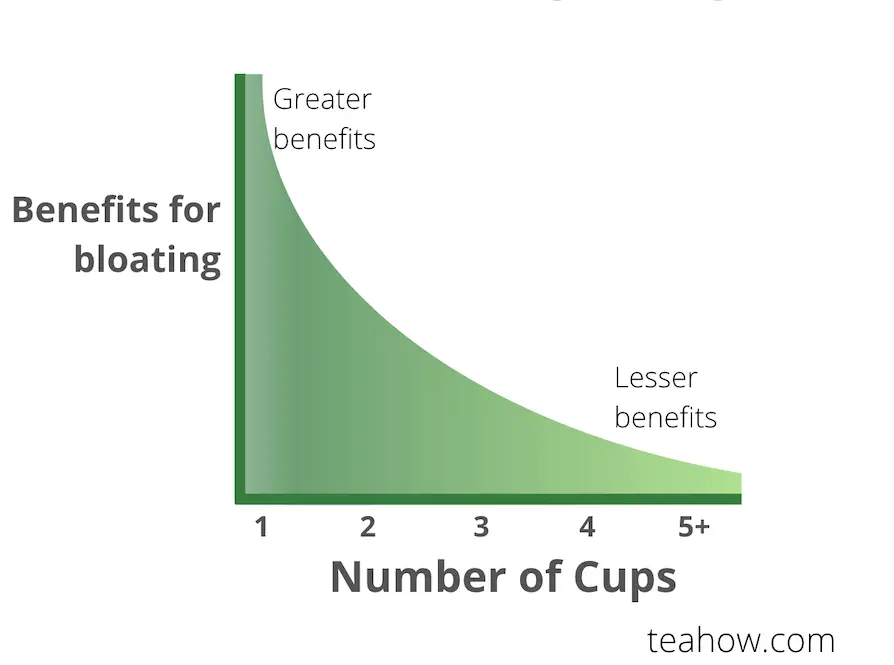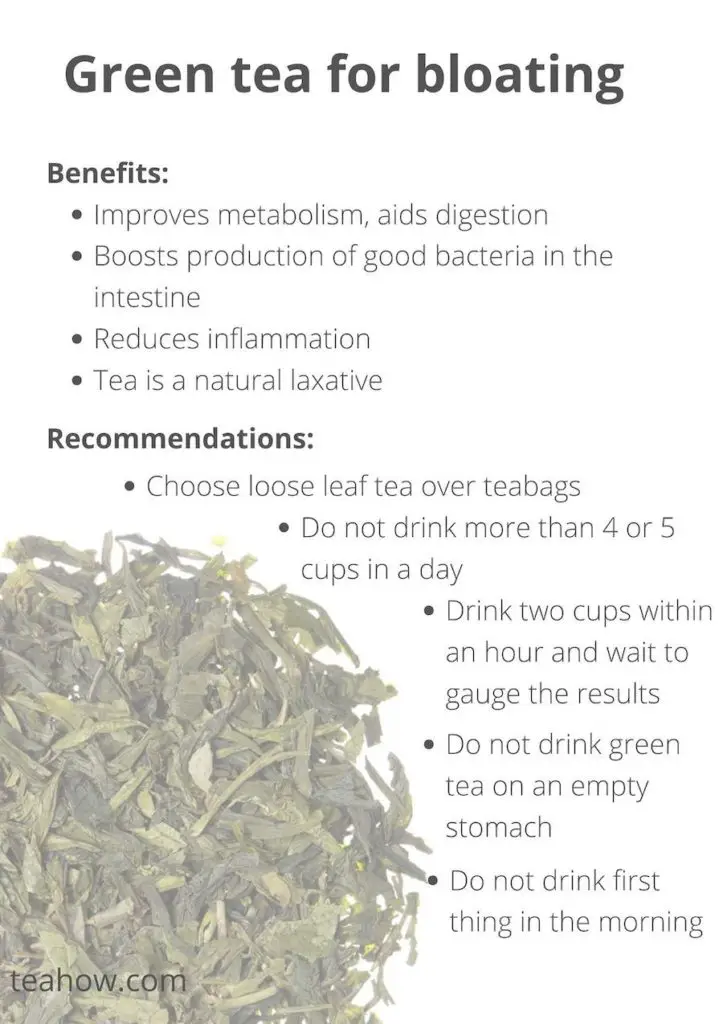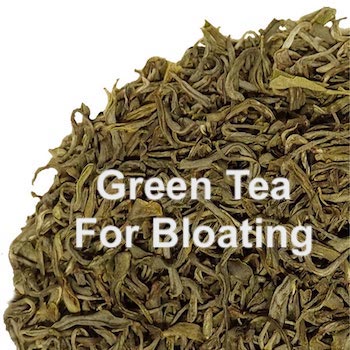You might be a regular drinker of tea, or perhaps an occasional tea taker! But either way, perhaps you’ve considered, or are now thinking of taking green tea for bloating.
At some point, all of us have experienced bloating to some degree or another. Based on my experience as something of a tea connoisseur, I wrote a complete article on teas that can reduce bloating. This includes how and why they work.
But for this article, I’m focussing on just taking green tea for bloating.
I’ve been a tea drinker of many teas for many years. And I’ve taken green tea many times to help with bloating, it works for me. But when to take it, and how much can be important factors.
With a few simple guidelines to follow it should work for you too. Here’s the fast answer for you to start with…
Green tea reduces bloating with its combination of antioxidants and polyphenols. These stimulate metabolism and aid digestion. Taken at the right times and in the right quantities, green tea can reduce stomach inflammation by calming the digestive tract, and caffeine acts as a diuretic.
So let’s get into the details of why green tea is good for bloating and then when and how much to drink it…
Green tea and bloating
It’s known that green tea can reduce inflammation within the gut, reduce the build-up of gas, and ease digestion.
Green tea has been shown to decrease bloating. Warm green tea is anti-inflammatory, and will not increase gas. Drinking green tea is a simple and beneficial way to prevent gastrointestinal disorders. More than other teas, green tea contains EGCG which is the most beneficial type of catechin.
Active ingredients in green tea that reduce bloating
Green tea works simply because of the combination of ingredients it contains.
First of all, it’s an almost completely natural product. Green tea undergoes one of the least processing routes to produce.
Green tea has been less oxidized and so still contains many natural nutrients that are often removed through oxidation and other processes. More so than black tea, that will not be as effective as green tea for bloating because of reduced nutrients.
So let’s move on to what nutrients and components green tea has more of than most other teas. And by teas, I mean teas derived from the tea plant Camellia Sinensis. There are of course herbal tea alternatives you can take for bloating.
Let’s start with Antioxidants…
Antioxidants and Polyphenols
The combination of antioxidants and polyphenols present in green tea are known to improve metabolism, aid in digestion, and thus help to irradicate lingering gas.
But in terms of improving metabolism, we shouldn’t exaggerate this point.
Improving metabolism for most remedies has minimal impact. Certainly taking green tea “helps” to lose weight, but it has been proven that the effects of green tea on metabolism. although beneficial – they are minimal. And should not be relied on for weight loss…
But of course, what we’re focusing on here is using metabolism to help the body to dispose of unwanted gas and food waste in the short term. Increased metabolism can certainly help with this aspect.
What I’ve found when taking green tea for bloating, is that often it will reduce bloating and help clear the digestive system, but that can then give way to increased hunger. So this is something to watch out for.
Green tea boosts healthy bacteria
Green tea supports and boosts the production of good bacteria in the intestine, this helps to further improve digestion, making foods that are difficult to digest become easier.
In fact, this point isn’t just the benefit of green tea, all teas have been shown to improve and promote healthy bacteria in the gut.
So this includes black tea, Oolong, Pu-erh, and Fuzhuan teas (dark fermented teas).
Reduces inflammation
Bloating of the stomach due to inflammation and green tea reduces inflammation.
Due to stress the stomach bloating occur and the caffeine and theanine present in the green tea help in removing the stress.
Tea is a natural laxative
As part of this group, black tea, green tea, (and coffee too) naturally contain caffeine. For a lot of people, this stimulant often increases the speed of bowel movements, particularly in the morning.
A drink like coffee is regularly taken in the morning and often quickly encourages any laxative effects to start working. The same can be ok for black tea for many people. I mean, it’s called breakfast tea in England for good reason.
But what I would say – from experience, is it’s not advisable to drink green tea first thing in the morning, this can lead some people to nausea and sickness. More on when to drink it shortly.
Here’s more information on the caffeine in green tea. But let’s go on to discuss when green tea can cause bloating, and then my recommendations as to when you should take green tea – and when not to drink it…

When green tea can cause bloating
I hear lots of people saying that green tea causes them to bloat, and there are reasons for this.
Generally, drinking more than three cups of green tea can promote acidic build-up in the stomach. In turn, this can cause acid reflux, and bloating. Spacing drinks apart and assessing the results helps avoid bloating from green tea.
Greater than 3 or 4 cups of green tea can also begin to cause mineral deficiency, as tannins in green tea bind with iron and other minerals to prevent absorption into the body.
Follow the simple steps below to help avoid bloating from green tea, and to also get the best out of green tea to tackle bloating.
When to drink green tea
- Drinking green tea in between meals is the optimum time. Allow an hour after your meal and an hour before the next where possible.
- Green tea mid-morning can increase concentration. The amino acid of L-Theanine boosts energy and enables you to concentrate better
- Green tea can aid in burning calories and increase energy levels, taking an hour or so before exercise may mean you can exercise longer and gain more from your workout.
- Drinking green tea 2-3 hours before sleep is the optimum time to boost metabolism.
For more advice, see my article on When to drink green tea.
When not to drink green tea
Here are the occasions I would recommend you avoid taking green tea.
- Do not drink green tea on an empty stomach, it can lead to nausea and a feeling of sickness.
- Avoid taking green tea first thing in the morning before a meal. It can cause nausea and a sickly feeling. Green tea has a high content of catechins that can adversely affect the liver.
- Consuming green tea on an empty stomach at any other time of day can cause nausea and a feeling of sickness.
- Do not drink green tea with a meal, this advice applies to most teas. Wait at least one hour after a meal.
- Avoid drinking water alongside or just after your green tea, this will amplify the acidity and may cause gas build-up rather than remove it.
- Do not drink green tea within 2 hours before going to bed, the caffeine may keep you awake
- Be mindful that food you‘ve eaten prior to or after drinking green tea may actually be the cause of bloating – not the tea itself.
Diminishing returns per cup
Everyone is different of course. From my experience, it’s not a case that each additional green tea you drink has the same effect on reducing bloating.
There are diminishing returns… so your first drink should alleviate most of the problems. A second will help a little further. Beyond that, there are fewer benefits that each cup brings, as the body has already received the help it needs.
The benefits that you get from each cup would resemble the chart below in terms of how each cup adds benefits to the body.
Diminishing returns per cup graph
The benefits that you get from each cup would resemble the chart shown here in terms of how each cup helps reduce bloating in the body.
The first cup is really the one that should bring the majority of relief.

Space drinks apart to gauge the results
For this part, you ideally need to lsiten to you body to discover what works best for you.
Typically, I would take 1-2 cups of green tea within an hour. I would then usually leave it for at least another hour before taking it again. This way I can gauge if the first two cups have helped reduce the bloating.
At that point, I can then decide if the two cups of green tea reduced or eradicated the bloating enough. Or, if I need to drink some more, or even if I need to try an alternative remedy.
What to add to green tea for bloating
There are other ingredients that you can add to your green tea to reduce bloating even further. Take a look at my list of teas to reduce bloating, they outline which teas will tackle which type of bloating you’re experiencing.
Adding sugar to green tea does not reduce bloating
Our bodies struggle to digest processed, refined sugars. Sugar like Sorbitol and fructose are commonly found in processed foods. This can cause gastrointestinal distress. Taking sugar will likely contribute to bloating rather than reduce it.
Taking sugar in your green tea will not necessarily impede the digestive benefits of green tea, but will counteract its positive effects on the gut. This may result in seeing limited benefits from taking green tea.
But what about milk in your green tea? Does this help? Let’s get into that next
Adding milk to green tea does not reduce bloating
Adding milk to green tea, while unusual, is not totally unheard of. Milk in tea acts to cancel out a lot of the benefits of green tea. Milk can negate the beneficial work that catechins do to reduce gastrointestinal inflammation, ease digestion and reduce gas.
There are some alternatives to adding milk which you might want to explore further in my article on adding milk to green tea.
How many cups of green tea to help with bloating
In general, 3 cups of green tea per day is seen as the optimum amount to help reduce bloating. It’s less about cups per day and more about regulating the amount as and when required. Green tea can certainly help to keep bloating at bay with a regular intake. Limit to no more than 5 cups per day.
This exact figure depends on your personal needs, preferences, and tolerances. But you should work within the boundaries of 3-5 cups a day to gain the full benefits. Plus where possible, opt for loose leaf green tea. Loose leaf is just more likely to yield better results.
Personally, it’s rare that I go over four – and I’m a tea connoisseur, so maybe that tells you something. Even though – strangely – you can get more than this number of steeps from loose leaf green tea.
You can find more on this, plus how it compares to other teas in my article on how many cups a day we should drink.
You can find out more about green tea here. But green tea isn’t the only tea of course, and how you make it can make a difference. So let’s see if I can add some further tea help for you.
More tea help
I hope this has helped you to understand how to use green tea for bloating. How much green tea to drink to reduce that bloated feeling and further information around it. If you like drinking tea then you’ll love my Tea Somellier course. It’s designed to elevate your tea skills quickly, here’s some more information…

Take the fast track and become a tea connoisseur
Whether for enjoyment or considering a career as a tea sommelier. This course has everything you need to enhance your tea knowledge and tea-tasting skills.
This course keeps it simple with step-by-step tea tasting and easy reference guides
For pleasure, or as a precursor to a career in the tea industry. Find out what tea sommelier actually does, their career paths, and what they earn.

Find out more about the Teahow Tea Sommelier Course!
Find out more about the Teahow Tea Sommelier Course!

